Scott Neeson on giving up Hollywood to help Cambodia’s vulnerable

Scott Neeson turned his back on a life in Hollywood to live in Cambodia and help its poorest people. Twenty years later, the former Adelaide movie executive has achieved so much more, bringing hope and opportunity to entire communities.
Words Genevieve Meegan
Giving up a successful career in Hollywood to live amongst Cambodia’s poorest people is an idea that seems difficult to understand. But for Scott Neeson, nothing could have made more sense.
In the late 1990s, Scott was president of 20th Century Fox International, one of the most powerful positions in the global movie business. He lived in a mansion in the Hollywood Hills, drove luxury cars, had a boat, dated models and counted stars such as Harrison Ford, Heather Graham, Mel Gibson and Meg Ryan as friends.
By his mid-40s Scott was overseeing the release of blockbuster hits such as Titanic, Braveheart, X-Men and Star Wars, and had more money, success and privilege than he’d ever imagined possible.
Not bad for a boy who grew up in Elizabeth and dropped out of high school at age 16.
But a trip to Cambodia in 2003 changed everything.
At the time, Scott was due to take up a new role with Sony Pictures, but he decided to take a break from the Hollywood bubble and “cleanse his soul”. The meditation and yoga devotee headed for Phnom Penh where he wanted to meet and help the most vulnerable in the community. This led Scott to a local dump called Stung Meanchey, also known as “Smokey Mountain”, due to the plumes of putrid smoke rising above the rubbish.
The dump, on the outskirts of Phnom Penh, covered about 100 acres and was home to more than 1600 children, 40 per cent of them abandoned. These children, some as young as two years old, spent their days and nights scavenging through the mountains of rubbish looking for recyclables to sell. They lived, worked and slept at the dump.

Scott recalls his first visit to Stung Meanchey, overwhelmed by the oppressive heat, the toxic fumes and the children covered in dirt.
“The worst thing was the heat, because it’s a hot country and the methane builds up under the rubbish,” he says.
“It’s like a lava is burning, it’s lava made of garbage basically. It feels like hell. In a lot of cases these kids have been left there by their parents, others were orphaned and made their own way there and their life was to find plastic bottles and metal, and make maybe 50 cents a day, enough for some rice and water. They just sift through the rubbish dump, wake up and do it again. It was horrible.
“The interesting thing was when I first went there the kids basically paid no attention to me, and that was disturbing. They were almost like ghosts, they were unfazed.”
On that first visit, Scott was prepared for the young children to ask him for money, but then one child approached him and asked, “Can you get me into school?”.
“That was the most disarming moment that really made a big, big difference,” he says. “I don’t know how you could say no to that. I didn’t know if it was a boy or a girl because they were all covered in rags and scarfs because it’s so bloody hot there and, of course, they have no place to leave their things, so they must carry everything with them.”
Scott managed to track down the child’s mother on the dump and a very sick younger sister. Through a local contact, he then arranged rental accommodation for them at $15 a month, as well as regular food, water and schooling for the children. The next day he went back to the dump and found two more children who wanted to go to school.
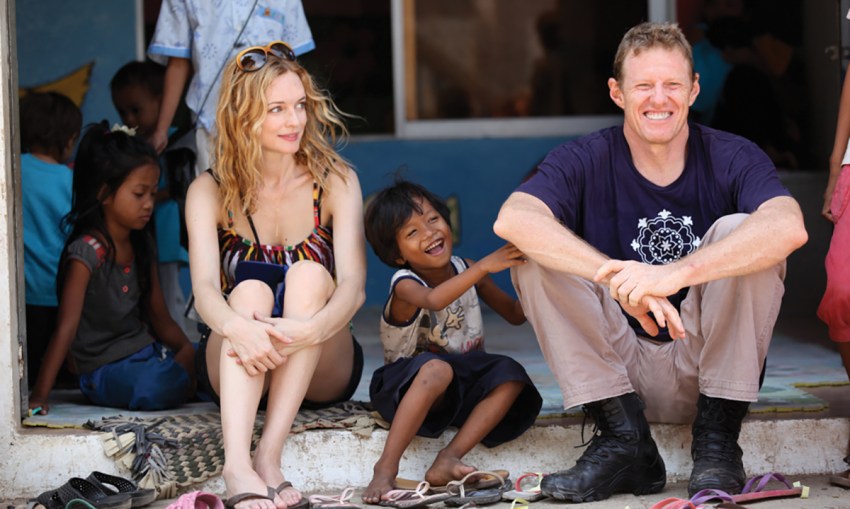
“That was the moment where I was face to face with my own values because I realised that if I can do this for four or five children with little effort and not much money, why aren’t I doing it for hundreds of children?” he says. “It was like getting a ‘virus’ at that stage and I just had to keep helping. My life as I knew it had changed.”
Scott returned to LA and tried to resume his corporate life – but his mind was in Cambodia.
“It was horrible going back into a corporate meeting with people who are very concerned about the test results for a new movie, and you’re having a deep conversation about these things,” he says. “My mind was not there. It was just wanting to get back to Cambodia, but I made a promise that I would not make any rash decisions for 12 months.
“In the intervening period I would go to Cambodia every month and the appeal, the attraction, the ‘virus’ just got stronger. And then almost 12 months to the day, an impactful event made up my mind to move for good.”
You might like
Scott recalls standing on the dump, trying to help some sick children, when his phone rang. It was one of the biggest actors of the day, and his agent, on the line from LA. The actor was furious and refusing to board a private plane because it had not been stocked with the right food.
“When he calmed down, he said, and these are the exact words, ‘I don’t want to get angry Scott, but, you know, my life wasn’t meant to be this difficult’.
“So, I’m standing on this dump in front of this poverty, and it was very liberating because I knew that leaving LA was the right thing to do. I really don’t think it was a sign from above or anything, but you don’t want to ignore those moments when you see the world so clearly, those rare moments of clarity. And there it was. It was just so vindicating that my decision to leave was the right one.”

Scott headed back to LA and sold everything – his house, boat, furniture, luxury cars. He then moved to Phnom Penh and set about starting a school, with the aim to get as many children off the dump as possible.
He rented a building and staffed it with local teachers, going to Stung Meanchey every day for five years rescuing children. Along the way Scott got to know the children and their families by name and began picking up the Khmer language.
But he admits it was all an enormous learning curve.
“I went through a period of a cultural humiliation initially, because I came in there thinking I had all the answers,” he says. “I had this sense of, I believe there are empirical rights and wrongs, and I knew what to do and the locals can just listen to me. It just didn’t work that way.
“I managed to suspend judgment after a few years here because I had no understanding of what these families have been through or what they were facing in their everyday lives.
“The longer I was here, the less I knew for the first five years in Stung Meanchey.”
Initially, Scott calculated that with the funds from his house and boat sale, he could support the education of 86 children in perpetuity without having to start up a charity.
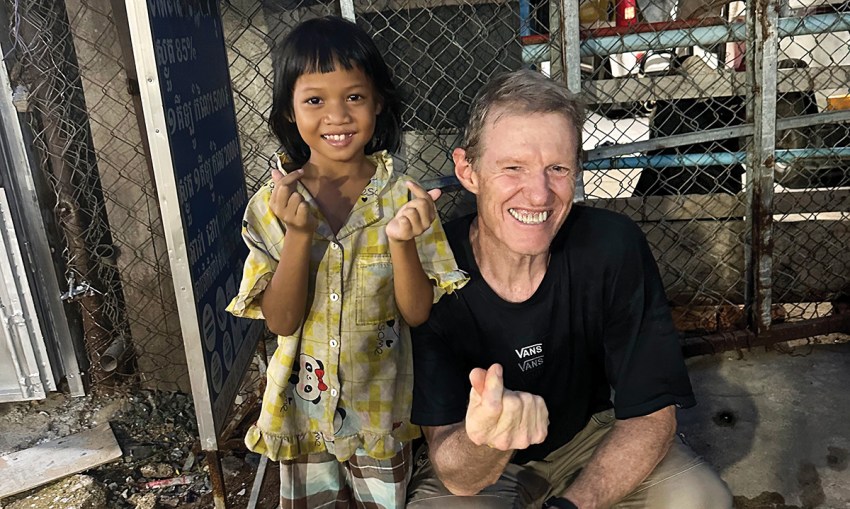
The plan was to get things set up, then he would work there a few days a week and spend the rest of his time motorbike riding around the region.
“It sounded like a good life,” he says. “What I didn’t count on was getting 86 kids in there and then the 87th child comes up and says, ‘can you get me into school?’. I can’t say no, I don’t think anyone could say no to that.”
So, Scott founded Cambodian Children’s Fund (CCF) in 2004 to accommodate the demand – what started out as a plan for 86 children became 140, then 200 and that number continued to double every year.
But what Scott soon discovered was that to lift children out of poverty and create generational change, support also needed to include families and entire communities, not just individuals. Getting children into school was one thing but keeping them there was another. The difficulty was that parents who were scavenging at the dump needed their older children to look after their younger siblings.
To tackle this problem, CCF built a nursery and kindergarten, and created incentives for families to keep children in school such as subsidised water and rice. Many of these Stung Meanchey families were also struggling with crippling debt, often created by health care bills which were charged at up to 20 per cent interest per month, so CCF set up a payment system to help families.
Access to medical care was also urgently needed so the organisation built a medical clinic that now provides free medical treatment to around 30,000 patients a year.
To finance all this support and infrastructure, Scott has spent the past 20 years travelling the globe raising funds and awareness for CCF, tapping into some of those famous contacts, including music legend Quincy Jones, actor Hugh Jackman and self-help guru Tony Robbins.
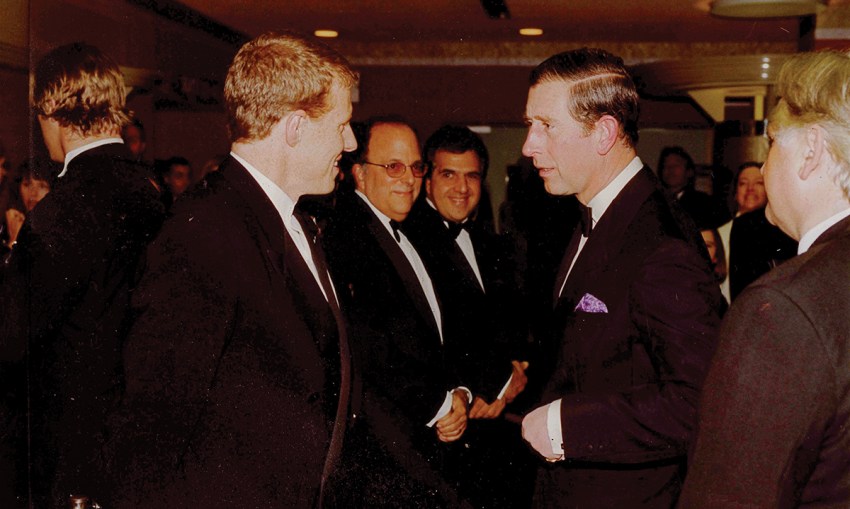
Actor Heather Graham has visited several times and loves to get out in the community with the children.
“Heather has no pretence about her and she’ll go on walkabout into the worst places and the kids will be all over her,” Scott says.
Scott’s connections and relentless fundraising has enabled CCF to build new housing, creating safe villages for the poorest in the community.
CCF has also established a Maternal Care Program for at-risk mothers, providing pre- and post-natal support for parents and families.
Scott talks proudly of another CCF initiative – the “Granny Program” – which began seven years ago and involves care for the elders of the community.
“Some of these older women were scavenging on the landfill and it was just a really sad situation,” Scott says. “So, I’d give them money, but once we got the high school in place, I really wanted the kids to become leaders and so I started the Granny Program. Now, three or four of our senior school students are responsible for visiting one granny twice a week.
“They check on their wellbeing and cleanliness, ensure they have fresh water and see if there are any obvious medical issues to report. But the reason I like it so much is that Cambodia had terrible Khmer Rouge days back in 1975-79 which killed 20 plus percent of the population. It took me a long time to realise the long-term effects of this.
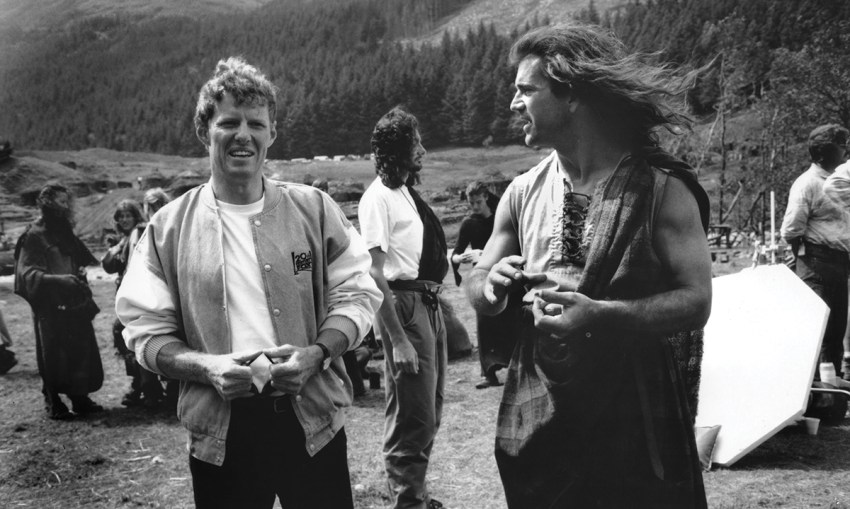
“The parents of these kids were all survivors of the Khmer Rouge days, and they have terrible levels of trauma. The connection with their children is fractured. And of course, from a practical sense, they’ve never experienced Cambodian culture. The parents also missed out on a childhood.
“The grannies, though, can talk about family values, the culture, traditions, storytelling, superstitions, and it’s really important to get that back. It’s also important for kids to grow up with a storyteller of wisdom, not wasting their time on Facebook, TikTok or watching influencers.
“In my opinion, if you want to develop the child and young adult you really have to have a well-rounded approach and I think you’ll see huge benefits of having that grandparent, older role model involved.”
Scott himself is very close with many older members of the community and often sits with the elderly, sick and dying, giving comfort during their final moments.
“I’ve done that many times and I’ve got to say it gives me a sense of meaning… I don’t speak much; it’s just being there.”
Tackling the ever-present issues of sexual and physical abuse and domestic violence has also weighed heavily on Scott who says many people in the community have experienced “unspeakable trials”.
Subscribe for updates
So, 12 years ago, CCF also established the Child Protection Unit headed by former Australian policeman Jim McCabe.
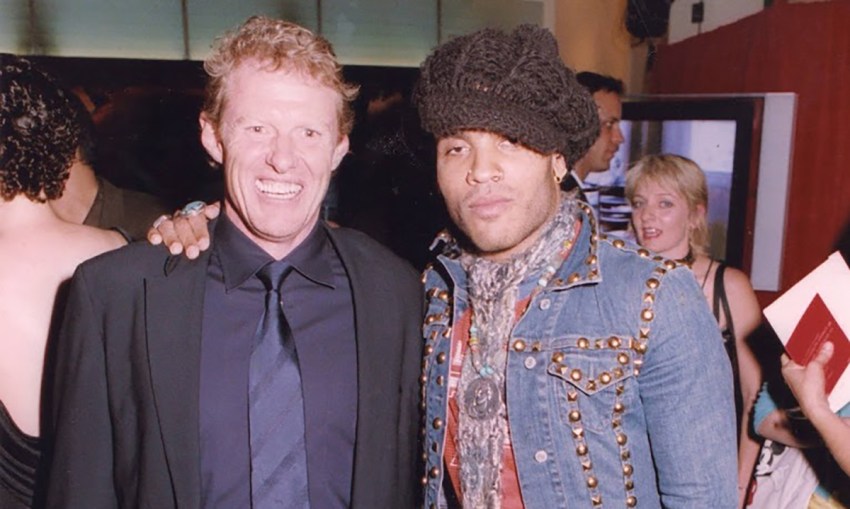
“The conviction rate for people who had abused children was appallingly low,” Scott says. “In fact, it wasn’t properly tracked, there weren’t the statistics, largely because of a lack of training, lack of resources. And you had repeat offenders in the community.
“Nowadays, virtually all serious child abuse cases across the country will come into the Child Protection Unit. And because there’s now solid investigation practices, protocols, police training, capacity building, use of forensics, that has changed the landscape. We now have a solid conviction rate; the police have been terrific.”
CCF now currently employs more than 400 staff, mainly Cambodian, and the charity operates under its pillars of education, leadership, career and life skills, childcare, community outreach and healthcare.
For Scott, it’s all a long way from the streets of Elizabeth where he grew up with his parents and older brother Norman.
Scott’s mother Elizabeth (Betty) was a cleaner, while Dad Colin worked in the Department of Defence and the boys attended Elizabeth North Primary School and then Elizabeth High School.
Scott says he was neither sporty, due to suffering severe asthma, nor academic, a situation compounded by a diagnosis of ADD as a child. He dropped out of high school at age 16 and got his first job via a government incentive scheme, working at the drive-in. He started out delivering posters as an assistant in the marketing department and was then promoted to projectionist.
Gradually he kept working his way up, eventually appointed to a national programming role for Greater Union Cinemas, before Hoyts offered him a marketing role in Sydney in 1984.
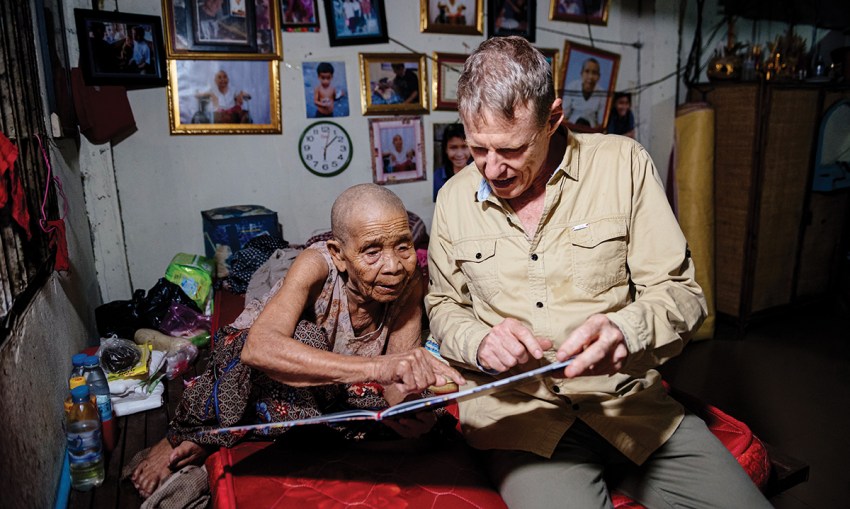
“I kept on getting good job offers,” he says. “Three years after joining Hoyts, they moved me to the distribution side, so looking after filmmakers and film releases. Then 20th Century Fox wanted me to work for them, but I was under contract, so Hoyts put together a three-way joint venture with Columbia Tristar Films and I was managing that relatively young, I was about 26 when that all happened. I was general manager of the whole Australian operation, and I thought I was the kingpin.”
Then, in 1993, Scott was offered the opportunity of a lifetime – to manage 20th Century Fox’s international marketing department based in LA.
“I ended up president of 20th Century Fox International and you’d think that would be the end of the story, but then I moved to Cambodia,” he says.
All up Scott spent 26 years in the film industry, and says many of the organisational, financial and managerial skills he gained in his career have helped in the creation and running of CCF. He admits that life in Cambodia can get overwhelming, but what brings him true joy is being with the children, who call him “Dad” or “Pa”, and seeing them transformed by a better life.
“They are clean, happy, in school and I know that in two years it will be hard to even comprehend where they came from,” he says. “To see these kids transformed in just a few weeks, to see the joy of them becoming kids again so quickly, it’s incredible. I feel like a proud father, and I’m seen as a father, even the grandmothers call me father.”
CCF’s flagship high school, the Neeson Cripps Academy, named after its Australian donors, the Cripps family in Melbourne, opened in 2017 just 300 metres from the former Stung Meanchey dump, which was shut down in 2009.
Around 93 per cent of students finish high school and 79 per cent of those go on to to a university education.

“One of our students went through one of the most terrible cases of abuse and she’s now studying and is a public speaker,” Scott says. “She’s incredible.”
Scott tells the story of another child who was rescued from the landfill and is now studying a PhD on scholarship in France and Brussels. He may also have an opportunity to study at Cambridge University in the UK.
“I was discussing this with him and he said, ‘Hi Dad, right now I’m working on radio frequency fingerprint identification by applied machine learning. It’s a four-year PhD so maybe I could go to Cambridge in 2027’,” Scott says.
“I can’t quite get my brain around it all because there’s just so much there now. The success of these kids is way beyond my expectation. I don’t really focus on the numbers. I just love being around them.”
Scott has received numerous humanitarian awards including The Grand Order of National Merit of Cheatopka, the highest honour in Cambodia, presented in 2018, and in 2019 he was appointed Senior Advisor to His Holiness Samdech Bour Kry, the recognised leader of Buddhism in Cambodia.
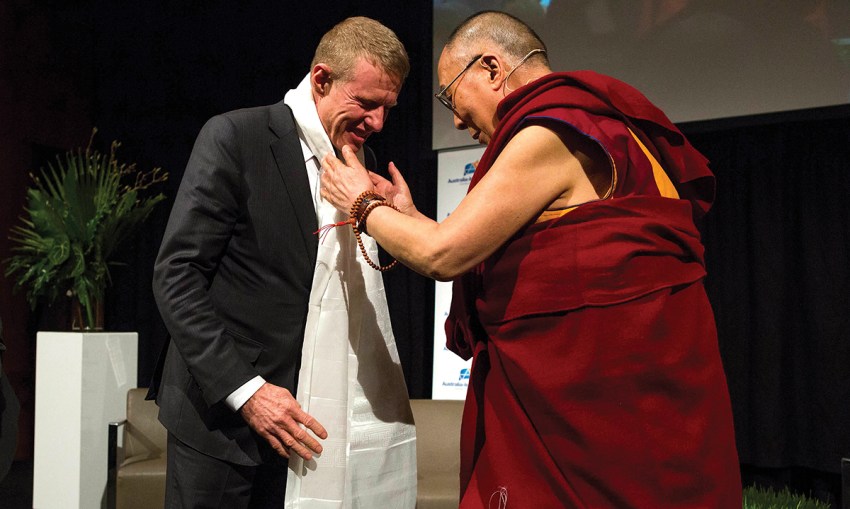
While the awards are satisfying, Scott, now aged 65, says it is the Cambodian people and the community that he now calls home that provides, “this unending amount of love which I’ve never had in my life”.
Most nights, Scott will walk the streets of the community where he has celebrity status. Children run up and jump into his arms, people crowd around and want to hug him or hold his hand, and everyone knows him by name.
He is single and says he never found “Mrs Right” during his Hollywood days, but dated a lot of “Mrs Right Nows”.
“But nothing came close to a relationship,” he says. “I have no interest in that life anymore. I have much more meaning today.”
Scott says his friends and family regularly visit, including his brother Norman and sister-in-law Louise Meek, who are film makers. His late father Colin, who Scott says he was never particularly close to, came to visit several years ago and became an instant Grandfather figure to hundreds of adoring children. It brought father and son closer together, too.
Colin passed away a decade ago at age 87 but Scott treasures his visits to Cambodia and says, “it was the happiest days of his life over here”.
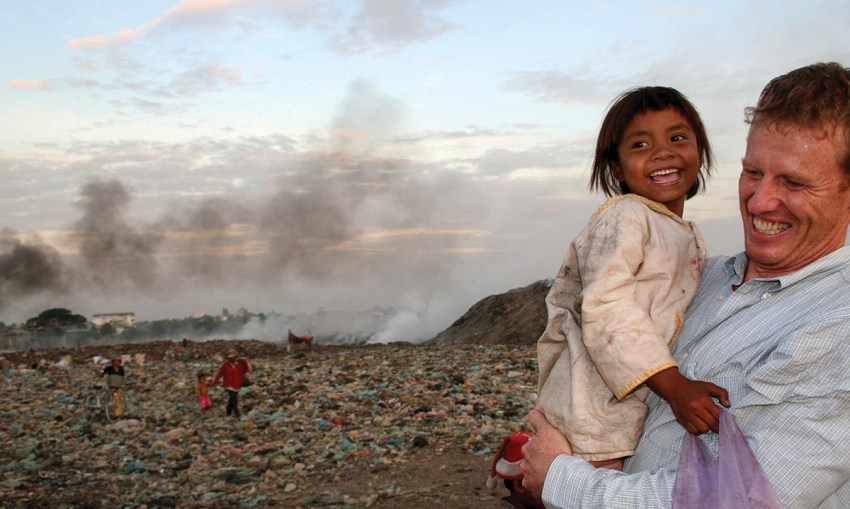
When Scott spoke to SALIFE he had two Adelaide friends visiting Cambodia for the first time and he was looking forward to showing them around.
“I love people to see what I see,” he says. “Sometimes they get a bit shut down, they don’t see all the beauty amongst the squalor. That’s what I see, the miracles.”
Today, there are seven CCF schools educating 1800 students. Now that the charity is running so well, Scott says he is happy to step back slightly, and plans to spend more time in Adelaide in the future.
He will be back home in September as the guest of honour at a fundraising dinner hosted by his close friends, film-makers Kerry Heysen and Scott Hicks at the State Library of South Australia.
Ironically, Scott is aware his life story sounds like the stuff of a blockbuster movie – Aussie school dropout makes it big in Hollywood only to give it all up and find true happiness helping life’s poorest and most in need.

“I’ve found what I love and I love what I do,” he says. “There’s no end point here. I’m softer now and far more open. I was very closed down before with not much emotion. I just feel like the most blessed person.”
The Cambodian Children’s Fund Inaugural Adelaide Dinner will be held in the Mortlock Chamber, State Library of South Australia, on Friday, September 20. For ticket details go to Humanitix.
This article first appeared in the August 2024 issue of SALIFE magazine.




